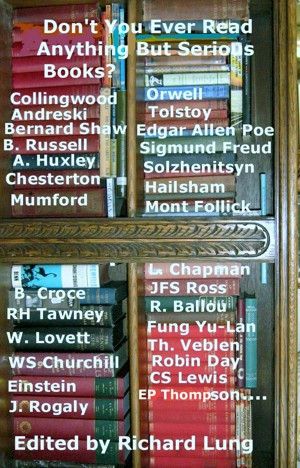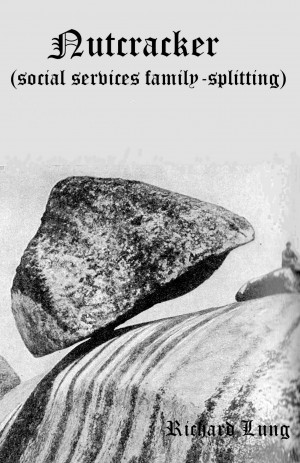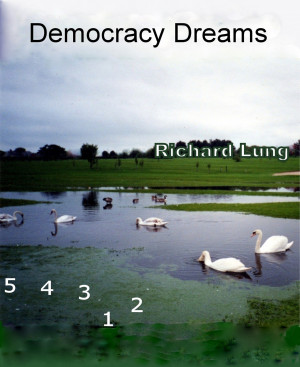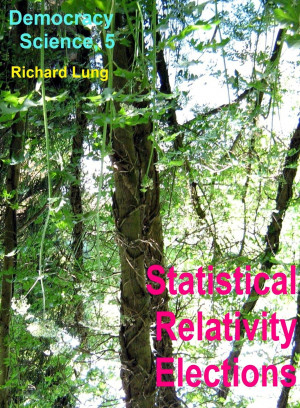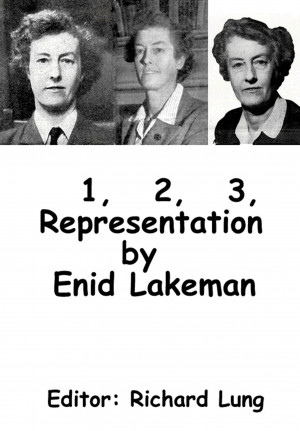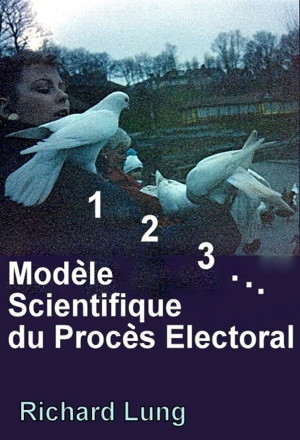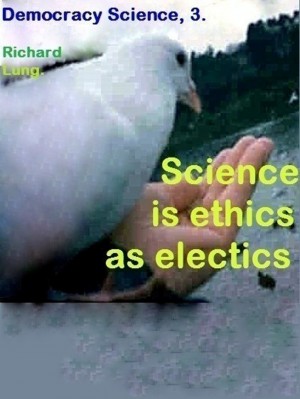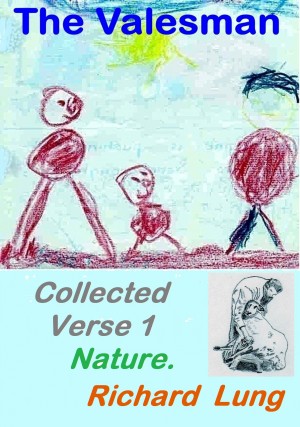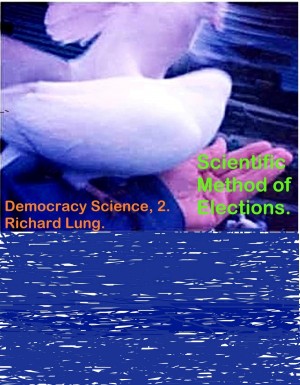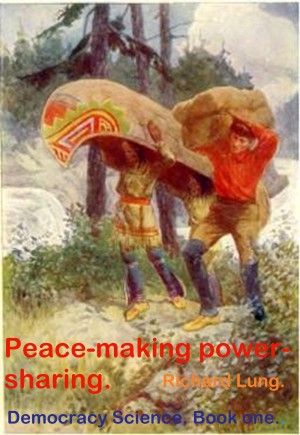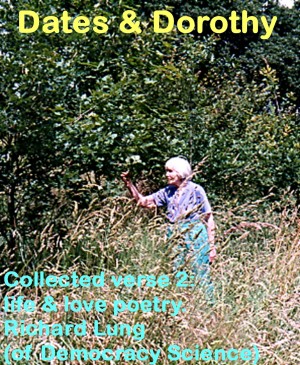Location: United Kingdom
Member Since:
Sep. 06, 2014
6 readers have added this author as a 'Favorite Author'.
Richard Lung
Biography
My later years acknowledge the decisive benefit of the internet and the web in allowing me the possibility of publication, therefore giving the incentive to learn subjects to write about them.
While, from my youth, I acknowledge the intellectual debt that I owed a social science degree, while coming to radically disagree, even as a student, with its out-look and aims.
Whereas from middle age, I acknowledge how much I owed to the friendship of Dorothy Cowlin, largely the subject of my e-book, Dates and Dorothy. This is the second in a series of five books of my collected verse. Her letters to me, and my comments came out, in: Echoes of a Friend.....
Authors have played a big part in my life.
Years ago, two women independently asked me: Richard, don't you ever read anything but serious books?
But Dorothy was an author who influenced me personally, as well as from the written page. And that makes all the difference.
I was the author of the Democracy Science website since 1999. This combined scientific research with democratic reform. It is now mainly used as an archive. Since 2014, I have written e-books.
I have only become a book author myself, on retiring age, starting at stopping time!
2014, slightly modified 2022.
While, from my youth, I acknowledge the intellectual debt that I owed a social science degree, while coming to radically disagree, even as a student, with its out-look and aims.
Whereas from middle age, I acknowledge how much I owed to the friendship of Dorothy Cowlin, largely the subject of my e-book, Dates and Dorothy. This is the second in a series of five books of my collected verse. Her letters to me, and my comments came out, in: Echoes of a Friend.....
Authors have played a big part in my life.
Years ago, two women independently asked me: Richard, don't you ever read anything but serious books?
But Dorothy was an author who influenced me personally, as well as from the written page. And that makes all the difference.
I was the author of the Democracy Science website since 1999. This combined scientific research with democratic reform. It is now mainly used as an archive. Since 2014, I have written e-books.
I have only become a book author myself, on retiring age, starting at stopping time!
2014, slightly modified 2022.
Smashwords Interview
Where to find Richard Lung online
Website: http://www.voting.ukscientists.com
Books
Don't You Ever Read Anything But Serious Books? Volume 2.
by Richard Lung
Price:
Free!
Words: 121,770.
Language:
English.
Published: March 9, 2024
.
Categories:
Nonfiction » Psychology » Theory, Nonfiction » New Age » Supernatural
I should make a few things clear about these book notes. They followed from a school-time habit, with this crucial difference. They were set to my own liking and not to some academic curriculum. I didn’t realise how different this makes them, and guessed that the scribble would be just as unintelligible and uninteresting as my educational dictation.
Don't You Ever Read Anything But Serious Books?
by Richard Lung
Price:
Free!
Words: 110,370.
Language:
English.
Published: August 20, 2023
.
Categories:
Essay » Literature, Nonfiction » History » Modern / 20th Century
I recalled the coincidence of two women friends, not in contact with each other, who spontaneously asked me: "Richard, Don't You Ever Read Anything But Serious Books?" I just left out my name, and had my title.
And Him Me' Be
by Richard Lung
Price:
Free!
Words: 23,440.
Language:
English.
Published: May 7, 2023
.
Categories:
Screenplays » Biographical , Nonfiction » Social Science » Death & Dying
(Sometimes holding on to me to keep steady, Ella walked out of the care home lounge into the entrance hall. To staff): I want to go home to my son. Why can’t I go home? – It’s a free country!
They've Taken My Life
by Richard Lung
Price:
Free!
Words: 33,460.
Language:
English.
Published: July 10, 2022
.
Categories:
Screenplays » Biographical , Nonfiction » Health, wellbeing, & medicine » Diseases / Alzheimer’s & dementia
What am I here for? Why are they keeping me here? It’s not my home… I can’t understand life, at all. It’s so bloody complicated…. I want to be with you. I’m safe, then. I never had it, in my life before. I just wanted a rest, that’s all. I love you, tho. Don’t you forget it.
A Nation Neglectful of the Elderly
by Richard Lung
Price:
Free!
Words: 55,660.
Language:
English.
Published: May 26, 2022
.
Categories:
Screenplays » Biographical , Nonfiction » Health, wellbeing, & medicine » Medicine » Caregiving
I don’t know what the hell I’ve done wrong. Oh, I’m so tired of it. I’m so sick of being on my own, in this place. I don’t know anybody. And I haven’t anybody to go with. And even if I did, it’s sort of pouncing on somebody elses life. -- I grieve for you. -- Well, grieving won’t do any good. I grieve for myself. It’s only doing things. All that's wishy-washy; doesn’t do nowt. All that hoping...
Mother and Son
by Richard Lung
Price:
$0.99 USD.
Words: 45,340.
Language:
English.
Published: April 29, 2022
.
Categories:
Screenplays » Biographical , Nonfiction » Health, wellbeing, & medicine » Healthcare issues
It’s no good, day after day, night after night; it’s a nightmare... without any friends, any relatives, nothing. I’m fed up with it. I’m thinking [can’t you get me out of here]? - I can’t...; it’s against the law. [Ella called a wicked law: deprivation of liberties.] [It’s a free country, isn’t it?] - Not any more. - And I die, in between... I’ve no hope. It’s not a haven. It’s one poor old girl.
Electoral Reform in a Toy World of Post and Press
by Richard Lung
Price:
Free!
Words: 5,910.
Language:
English.
Published: November 21, 2021
.
Categories:
Nonfiction » Politics & Current Affairs » Democracy, Nonfiction » History » Social history
In those days, the General Post Office and the local Press were housed side-by-side, in architectural splendour, with a touch of polished granite solidity. Their semi-residential street was like the backbone and brain stem of the town. The Post brought letters and literature, from the secretary of the Electoral Reform Society. The Press, for me, was the letters section of the local daily...
Elect and Exclude. Binomial STV Hand Count Basics
by Richard Lung
Price:
Free!
Words: 2,240.
Language:
English.
Published: October 23, 2021
.
Categories:
Nonfiction » Politics & Current Affairs » Democracy, Nonfiction » Social Science » Political science » Political process / elections
Power corrupts and absolute power corrupts absolutely, as Lord Acton said. Monopoly power, principally of the state, even in civilised countries, can grievously oppress the innocent. No man is good enough to be another mans master, as William Morris said.
Binomial STV is able to exclude, as well as elect candidates. It promotes friends and helpers. It can also remove masters and oppressors.
The Super-Vote Supercharged: Binomial STV elections Hand Count
by Richard Lung
Price:
Free!
Words: 3,800.
Language:
English.
Published: September 26, 2021
.
Categories:
Nonfiction » Social Science » Political science » Political process / elections, Nonfiction » Politics & Current Affairs » Democracy
An axiom of science aspires to one truth. All election methods are also exclusions. But the ways to elect and exclude candidates are all counted differently, as if there were two truths to representing voters. Therefore, the worlds voting systems must be false. Indeed, they are rendered obsolete, by an election method that counts elections and exclusions, in the same way: This is Bi-nomial STV.
Nobody Knows
by Richard Lung
Price:
Free!
Words: 50,180.
Language:
English.
Published: April 13, 2021
.
Categories:
Screenplays » Biographical , Nonfiction » Health, wellbeing, & medicine » Elder care
I would bring you back home.
Yes, I should be living in it. ‘Cos I own it.
The state takes too much power over family life. (Their excuse, you’ve lost your memory.)
I’ve got a good memory, for my age. Everybody has a memory lapse, and they can’t lock ‘em up, because they can’t hear [or remember].
I sympathise.
(Never mind, sympathise.) It’s a crime, in my opinion. Down to brass tacks: it’s wrong.
Another Mans Master
by Richard Lung
Price:
Free!
Words: 50,960.
Language:
English.
Published: January 16, 2021
.
Categories:
Plays » European / English, Irish, Scottish, Welsh, Nonfiction » Health, wellbeing, & medicine » Diseases / Alzheimer’s & dementia
Memories rest on a foundation of habit. The greater the habit, the stronger the foundation. The dementia sufferer has lost the time corrective to memories that are no longer true. And finds it harder to adjust to current realities. Instead of understanding and helping, with home care, officials take barbaric advantage of this mental handicap, and degrade it, forcing such elders into institutions.
Ella Sobs Her Heart Out
by Richard Lung
Price:
Free!
Words: 40,660.
Language:
English.
Published: November 1, 2020
.
Categories:
Plays » European / English, Irish, Scottish, Welsh, Nonfiction » Health, wellbeing, & medicine » Diseases / Alzheimer’s & dementia
Ella was already reduced to sobbing misery, at her incarceration. Social services so-called “best interest” meeting dismissed her protests as nothing but “occasional distress”. (Distress is occasional. That does not excuse the breach of her human rights.) Ella was not allowed to attend, to put in a single word, about her best interests. She has given me over 100,000 words, in a series of journals.
So, You've Got A Prisoner Mother
by Richard Lung
Price:
Free!
Words: 43,740.
Language:
English.
Published: October 4, 2020
.
Categories:
Nonfiction » Health, wellbeing, & medicine » Diseases / Alzheimer’s & dementia, Screenplays » Biographical
Ella suffers emotionally from separation from the son she loves, in the house, she earned. She suffers mentally from a punishing imprisonment, she does not deserve. And she suffers physically as a pneumonia-history patient, acutely sensitive to the cold, that a normal care home does not suit. She is 95, set to die there, because social services only obstruct.
Power Mannequins
by Richard Lung
Price:
Free!
Words: 42,920.
Language:
English.
Published: August 3, 2020
.
Categories:
Nonfiction » Health, wellbeing, & medicine » Healthcare issues, Screenplays » Biographical
Can you write? Tell them I want to be with my son, that I love with all my heart, and I’m deprived of the last beautiful thing I have in my life. The most beautiful thing in my life, and the way it’s been kept away from me is what is going to kill me… Ella has rights as a human being, and a free citizen, enshrined in the Mental Capacity Act, which the Hardie report says is not being implemented.
Impaired Imprisoned Innocent (Speak Thy Grief)
by Richard Lung
Price:
Free!
Words: 45,230.
Language:
English.
Published: July 27, 2020
.
Categories:
Nonfiction » Health, wellbeing, & medicine » Diseases / Alzheimer’s & dementia, Screenplays » Biographical
Reading again this selection, from seven previous journals, mainly in Ellas own words, reminds me how long she has been suffering, from being institutionalised by social services. It also reminds me how much I kept trying to get this fact over to the authorities. I plead with them to free my mother to go to her home, she worked for, with the son she loves, and loves her.
Short-Wave Memory Mum (Life-Imprisoned on Her Life Savings)
by Richard Lung
Price:
Free!
Words: 47,680.
Language:
English.
Published: July 25, 2020
.
Categories:
Screenplays » Biographical , Nonfiction » Health, wellbeing, & medicine » Diseases / Alzheimer’s & dementia
On 30 June 2020, according to a funeral director, every single care home in town had the covid. Social services twice stopped me from bringing Mum home with a live-in carer (as told in the second book in this series). They put her life in mortal danger, as a result. Yet, their Deprivation of Liberties renewal, which they have the gall to say is for her "safeguard," is just a rubber stamp.
Nutcracker (Social Services Family-splitting)
by Richard Lung
Price:
Free!
Words: 8,080.
Language:
English.
Published: June 16, 2020
.
Categories:
Nonfiction » Health, wellbeing, & medicine » Healthcare issues, Nonfiction » Social Science » Human Services
A top-heavy monolithic state is a hugely unproductive massing of honest-work-shy human resources, mighty in oppression and extortion, or capture and confiscation, of the small and helpless. A rocking boulder, hundreds of tons in weight, could crack a nut, to extract the kernel. It was, in effect, a Nutcracker. Britains barbarian bureaucracy of family-splitters is also.a Nutcracker of sorts.
Talking To A Cat In The Moonlight (Poorly Mind Lovely Mother)
by Richard Lung
Price:
Free!
Words: 37,440.
Language:
English.
Published: May 27, 2020
.
Categories:
Screenplays » Biographical
Ella was banned from an official meeting, which decided her Best Interest was to keep a ban on her, from leaving a care home, and confiscate her funds, to ensure tormenting her with life imprisonment. Doing everything to separate us, and nothing to support us, the Best Interest meeting was an all-out bout of adversary politics, and just as biased and dishonest, to justify the unjustifiably.
Democracy Dreams
by Richard Lung
Price:
Free!
Words: 5,200.
Language:
English.
Published: March 26, 2020
.
Categories:
Nonfiction » Social Science » Political science » Political process / elections, Essay » Sociology
A few pages fleeting dreams of democracy. Booklet alternative to my Democracy Science series of books 1 to 5.
Statistical Relativity Elections
by Richard Lung
Price:
Free!
Words: 67,570.
Language:
English.
Published: December 27, 2019
.
Categories:
Nonfiction » Science & Nature » Physics / Relativity, Nonfiction » Science & Nature » Research & Methodology
A mathematical physics text-book on Relativity theory by a nearly fifty-year amateur student. By far, my most specialist and difficult work. Not that the mathematics is advanced by professional standards but that the original, or unorthodox, ideas are unfamiliar and therefore inaccessible to layman and expert alike.
Home Free (How The Misery Makers Of Social Services Twice Obstructed Mums Home-coming With A Live-in Carer).
by Richard Lung
Price:
Free!
Words: 59,330.
Language:
English.
Published: December 22, 2019
.
Categories:
Nonfiction » Health, wellbeing, & medicine » Diseases / Alzheimer’s & dementia, Nonfiction » Relationships & Family » Family health
While keeping a smile, Ella asked eloquently, amongst other things, why was she not allowed to go home? She was not a criminal. She hadn't done anything wrong. What are they doing this for? They do it because they can get away with it - Give themselves a job, I suppose. A live-in care agency says that 97% of people would prefer to stay at home, when needing care.
1,2,3, Representation by Enid Lakeman
by Richard Lung
Price:
Free!
Words: 23,770.
Language:
English.
Published: August 14, 2019
.
Categories:
Nonfiction » Social Science » Political science » Political process / elections, Nonfiction » Politics & Current Affairs » Democracy
Enid Lakeman, author of the standard text, How Democracies Vote, was a world authority on electoral systems. Moreover, her exertions, in evidence-based reasonable persuasion, were legendary, for spreading the people power of transferable voting. Where she had electoral reform campaigning and letters to the Press, now the internet for this sample of the Lakeman liberation of voting method.
War From War foto companion
by Richard Lung
Price:
$0.99 USD.
Words: 2,450.
Language:
English.
Published: April 29, 2019
.
Categories:
Nonfiction » Biography » Historical biography, Nonfiction » History » European » Europe / Eastern
Before the Great War, on both open doors of the family store, like a Chinese divination, is the name of the skeptical Austro-Hungarian philosopher, who put sense experience before language, in an ironic endorsement of this Foto Companion, to my biography, War From War, which puts (some seventy) pictures before words.
John Stuart Mill: Proportional Representation is Personal Representation.
by Richard Lung
Price:
Free!
Words: 84,910.
Language:
English.
Published: June 22, 2018
.
Categories:
Nonfiction » Politics & Current Affairs » Democracy, Nonfiction » Philosophy » Methodology
The unstable one-sided development of mankind shows by comparing Mill the natural philosopher to Mill the political philosopher. For, A System Of Logic is like a work of antiquity, but Representative Government, after a century and a half, remains in advance of current thought. Proportional Representation as Personal Representation defied the ascendancy of party that is the Age of Benightenment.
FAB STV: Four Averages Binomial Single Transferable Vote.
by Richard Lung
Price:
Free!
Words: 50,180.
Language:
English.
Published: March 21, 2018
.
Categories:
Nonfiction » Social Science » Political science » Political process / elections, Nonfiction » Politics & Current Affairs » Democracy
The Single Transferable Vote (STV) is the “Super-vote”. Four Averages Binomial Single Transferable Vote (FAB STV) is the super-vote super-charged. Part one includes the classical school, especially by HG Wells, for “scientific method of voting” versus all the deficient distractions. If you understand Meek method, then you are in a good position to follow the blueprint for FAB STV in part two.
The Angels Weep: H.G. Wells on Electoral Reform.
by Richard Lung
Price:
Free!
Words: 51,970.
Language:
English.
Published: March 18, 2018
.
Categories:
Nonfiction » Politics & Current Affairs » Democracy, Essay » Political
It will be particularly interesting to watch the ingenuities of the politicians in the new Parliament in producing schemes that will look like electoral reform and yet leave the profession still active for mischief...Parliament throughout the next session, though it may make the angels weep, is certain to afford much entertainment to every mundane observer of human disingenuousness.
Single-stroke English (long edition)
by Richard Lung
Price:
Free!
Words: 40,580.
Language:
English.
Published: February 3, 2018
.
Categories:
Nonfiction » Education & Study Guides » Literacy » Alphabets & writing systems, Nonfiction » Language Instruction » English as a second language
In conservative youth, this reformer attempted fruitlessly to make English spelling regular. In middle age, I tried to invent radical new alphabets, also to no avail. In old-age, radicalism and conservatism combined, to produce, after a good few years trial and error, Single-stroke English (SE). I found out the hard way, that only a short-hand based on ones native alphabet, was memorable.
Modele Scientifique du Proces Electoral
by Richard Lung
Price:
Free!
Words: 7,420.
Language:
French.
Published: January 21, 2018
.
Categories:
Nonfiction » Social Science » Political science » Political process / elections, Nonfiction » Philosophy » Methodology
La représentation comme va problème scientifique de mesure. Il y a à notre disposition quatre échelles pour mesurer la représentation. L'échelle nominale, l'échelle ordinale, l'échelle à intervalles, et l'échelle à raison. Le scrutin transférable est un système co-ordonné du vote au dépouillement, dans un ordre de préférence empirique 1, 2, 3,. à l'ordre rational de 1, 2, 3,. membres majoritaires.
War From War
by Richard Lung
Price:
$2.99 USD.
Words: 70,630.
Language:
English.
Published: December 25, 2017
.
Categories:
Nonfiction » History » Military » Military / World War II, Nonfiction » History » Modern / 20th Century
A happy childhood in the Paradise of the Banat. A coming of age, thrown out of the services company, to fight in the Hell of the Russian Front. Purgatory in a foreign land. For, war does not end when the immediate fighting is over and everyone still (more or less) alive has left the battle-field. A man may be brought down instantly by injuries or, just as inevitably, near the end of a long life.
Single-stroke English (summary edition)
by Richard Lung
Price:
Free!
Words: 5,510.
Language:
English.
Published: October 31, 2017
.
Categories:
Nonfiction » Education & Study Guides » Literacy » Alphabets & writing systems, Nonfiction » Language Instruction » English as a second language
Single-stroke English or Single stroke English is the English alfabet simplified to single strokes. This may be shortened, for convenience of speech, to "Single English" given the abbreviation: SE. Single-stroke English (SE) is based on a rational system of one speech sound, one letter. This greatly simplifies English spelling. And the SE alfabet is kept short for ease of learning.
If the Poor are on the Moon... The Work of Mother Teresa.
by Richard Lung
Price:
Free!
Words: 11,990.
Language:
English.
Published: January 8, 2017
.
Categories:
Plays » Religious & Liturgical, Nonfiction » Biography » Religious biography
The Work of Mother Teresa, to fulfill her mission of love, this play follows. Only the strongest devotion could endure such sustained hardships and manage such achievements for the care of the poor and neglected.
Echoes Of A Friend: Letters from Dorothy Cowlin. Comment by Richard Lung.
by Richard Lung
Price:
Free!
Words: 36,130.
Language:
English.
Published: June 17, 2016
.
Categories:
Nonfiction » Relationships & Family » Friendship, Essay » Author profile
A gentle and generous soul, with a quiet and sunny disposition, well liked by many, and more radical than most, a deeply serious human being, with an over-worked conscience, who I once told was a monster of honesty. This was Dorothy, the solace of the friendless, the maker, who made a maker out of me, in her own letters, unshadowed by thoughts of publication.
Science is Ethics as Electics.
by Richard Lung
Price:
Free!
Words: 117,500.
Language:
English.
Published: June 15, 2016
.
Categories:
Nonfiction » Science & Nature » Research & Methodology, Nonfiction » Social Science » Political science » Political freedom
A universe, by definition independent, implies its own freedom. The debate, whether the universe is determined or governed by laws of chance, takes the opposite ends to a range from zero to infinite choice. Science is measurement, whose logic is an increasing power of choice to give the most accurate information. Knowledge and freedom depend on each other. They are the dynamic of progress.
He's a Good Dog. (He just doesn't like you to laf.)
by Richard Lung
Price:
$0.99 USD.
Words: 37,570.
Language:
English.
Published: May 6, 2016
.
Categories:
Fiction » Humor & comedy » Satire, Poetry » U.K. Poetry
"A Boot Boy in the Great War" is a verse and drama novela. A publishing agent forbad any stories about the Battle of Jutland or the pet budgie. This collection manages to break both tabus, together with a host of other undesirables. Not to mention Dafty Tailchaser, who tells the tale of the Good Dog and others of his kind.
The Valesman
by Richard Lung
Price:
$0.99 USD.
Words: 30,170.
Language:
English.
Published: April 25, 2016
.
Categories:
Nonfiction » Science & Nature » Farming, Nonfiction » History » Family history
This Yorkshire farmer worked six days a week from dawn to dusk. His only holiday was to France, which he got to tour three times, owing to a near fatal facial wound. Conscription no doubt made good use of his digging abilities in those trenches.
In The Meadow Of Night
by Richard Lung
Price:
$0.99 USD.
Words: 37,580.
Language:
English.
Published: April 19, 2016
.
Categories:
Fiction » Science fiction » Adventure, Poetry » Themes & motifs » Nature
Mankind has reached for the stars from forever. Modern astronomy is still grounded in antiquity. The poetry of nature and folklore is joined by science fiction and fantasy. Humanity wonders at its own existence. The over-whelming grandeur of the heavens ever unfolds itself before us. Our transitory and insignificant nature is impressed upon us.
Science and democracy reviews.
by Richard Lung
Price:
Free!
Words: 93,370.
Language:
English.
Published: October 12, 2015
.
Categories:
Nonfiction » Science & Nature » Physics, Nonfiction » Politics & Current Affairs » Democracy
As they separately pursue their shared ethic of progress, scientific research and democratic reform conduct themselves as two different journeys, both here followed, as the evidence mounts that they depend on each other to meet the stresses that survival poses.
Literary Liberties
by Richard Lung
Price:
Free!
Words: 83,010.
Language:
English.
Published: August 14, 2015
.
Categories:
Essay » Literature, Essay » Political
Literary Liberties with reality allow us to do the impossible of being other people from all over the world. Just as this world may be only one of many, that we cannot reach, a human version of the many worlds theory may be made a fact thru fiction.
Scientific Method of Elections.
by Richard Lung
Price:
Free!
Words: 128,580.
Language:
English.
Published: June 5, 2015
.
Categories:
Nonfiction » Politics & Current Affairs » Democracy, Nonfiction » Social Science » Methodology
The sheer difficulty of genuine electoral reform is shown and explained. The defeat of democracy is also a defeat for science. Freedom and knowledge depend on each other. Therein is the remedy. I base voting method on a widely accepted logic of measurement, to be found in the sciences. This is supported by reflections on the philosophy of science.
Peace-making Power-sharing.
by Richard Lung
Price:
Free!
Words: 104,970.
Language:
English.
Published: May 13, 2015
.
Categories:
Nonfiction » Politics & Current Affairs » Democracy, Essay » Political
The first Canadian Citizens Assembly found out the best electoral reform, only to have the goal-posts moved against its adoption. Britain had half a dozen undemocratic voting methods, because only that one democratic method could work at all levels of government. The world anarchy of election systems are passed off as fashion statements. But progress in democracy wont go away.
Radical!
by Richard Lung
Price:
Free!
Words: 50,840.
Language:
English.
Published: March 4, 2015
.
Categories:
Plays » Religious & Liturgical, Nonfiction » Politics & Current Affairs » Activism
Radical! begins with a play, If the poor are on the moon.., about Mother Teresa (currrently freely available in a separate volume). Monologs follow on artistic and scientific radicals (Berlioz, Sibelius, Sigmund Freud, JS Mill, Conan Doyle, Bernard Shaw, HG Wells, George Orwell, JB Priestley), as well as shorter features. Environmental verse and an essay on a statistical relativity conclude.
Dates and Dorothy
by Richard Lung
Price:
Free!
Words: 58,450.
Language:
English.
Published: September 6, 2014
.
Categories:
Nonfiction » Biography » Literary biography, Essay » Author profile
Since coming of age I wanted to change the world, when, in middle age, the world returned the compliment by changing me. That is when I met my guide and mentor Dorothy Cowlin.
Richard Lung's tag cloud
20th century europe
acting
administrative law
alan ayckbourn
aldous huxley
alexander solzhenitsyn
alphabet reform
animals
apocalyptic
austrohungary
authors
averages
banat
best interest
best interests
binomial stv
binomial theorem
birds
british government
british poetry
bureaucracy
cambridge pr
cancer
candidate exclusion
care home
care homes
charity
children
childrens pranks
christianity
citizens assemblies
classical music
composers musicians
corruption
cosmology
council confiscations
cut speling
death
dementia
democracy
democracy and freedom
democratie
deprivation liberties
deprivation of liberties
dogs
dorothy cowlin
double vote
due process
dystopian
early twentieth century
economic democracy
economic parliament
educational poetry and poems
einstein equivalence principle
elder care
elderly care
elderly mental impairment emi
elderly neglect
election science
election systems
elections
electoral justice
electoral reform
electoral reform society
electoral system
english help
english novelists
english poetry
english shorthand
english simplified
enid lakeman
environment
equality
euroelections
exclusions
famil rights
family
family life rights
family love
family rights
family splitting
fantasy
farming
first past the post
fmily love
forced adoption
frank britton
fraternity
freedom of election
freedom of information
freedom of spelling
friendship
friendship adventures
general elections
geometric mean
george orwell
german army
gorgeous
government
great war
h g wells
hand count
handcount elections
hare system
harriet beecher stowe
health authorities
hg wells
home care
hospital
human rights
human rights of elderly
impaired old age
initial transitional alphabet
inspirational and religious
interwar years
introspective psychology
irish election system
irving stone
j b priestley
jenkins report
jesus
john stuart mill
language reform
lay nuns
leaders notable people
learning english
least action
letters
liberty
listes des partis
literacy guide
literary biography
livein care
livein carers
local authority
local press
logic of measurement
loneliness
lorentz transformations
love
love poems
manual election
margaret atwood
meditation
meditations
meek method
meek stv
memory loss
mental capacity
mental capacity act
mentally impaired
mesure echelles
methode de borda
methode scientifique
michelson morley experiment
minkowski interval
missionary
modern history
mother son relations
mother teresa
mysticism
natural selection
nature
nature walks
nuclear power
old age
paranormal
parliamentary reform
party lists
peace
peace movement
peacemaking
personal representation
peter oborne
philosophers
philosophy
philosophy of science
phonetics
physics laws
pneumonia aftereffects
pneumonia history
poetry
poets
political
political campaigns
political power
politics
popular culture
postwar england
postwar history
poverty
preference vote
proportional representation
psychiatry
psycholgy
psychology
quantum physics
quotpart droop
radicals
rational alfabet
recreation
relativity
relativity theory
religious
religious cooperation
representation
roman alphabet
romania
russian front
safeguarding
saints
satire
scientific method
scientific romance
scrutin transferable
seaside holidays
secret justice
selfimprovement
shorthand
simplified spelling
single transferable vote
social choice theory
social history
social scientists psychologists
social services
sociology
solzhenitsyn
space opera
speculative fiction
spelling reform
spelling rules
spiritualism
stanislav andreski
star gazing
state abductions
statistical analysis
statistical information
stv
superluminal connections
surreal
symmetry
the arts
thomas hare system
thought abolition
time
timisoara
travel
two cultures
universal suffrage
values
vote unique transferable
voting method
voting methods
voting systems
war
wellsian
women authors
womens suffrage
world war 2
world war one
world war two
yorkshire
Smashwords book reviews by Richard Lung
-
The Many Benefits of Having No Friends
on March 04, 2016
The reader is never far from the authors thoughts, judging by the continual references to dear reader, gentle reader, my literary companion, and so forth. This is a conversation then or chit-chat, tho formally organised into chapters about the social round. Hence, the style is suitably simple. There are no literary allusions to authorities. The only authority is the authors personal experience. This is all well and good, because that is what we crave. Tho a fellow countrymen to the author, I still could be taken aback by the odd example of reckless crookedness, exposed by these confidences. Never mind, her observations rang true enough. This country seems to have thrown out the baby of good manners with the bath-water of etiquet. On occasion, such as the folly of co-renting, her distaste for her companion amounted to pure passion. Not of the sort I would recommend, despite an acute sympathy for her predicament. At this point, I was tempted to make a literary allusion to my favorite author, but, following Hartleys good example, I desist. Instead, I offer my most useful critical comment on this title. It is actually not about friends at all. It is much about the death, to esteem for ones companions, by a thousand cuts of more or less inconsiderate behaviour or slovenly disrespect, as well as confidence trickery and predatory scheming. Those companions, however, are not so much bad friends, as merely bad companions. The abject failures, in shared pleasure-seeking, dubious or down-right repulsive, which the book is largely about, is not friendship. The author seems to have no idea of friendship, as a sharing of interests, as is held by an author, more authoritative than we are. I would say the main interest, of the authors researches, are in finding what bores are everyone she has met. But she should know that is the whole point of friendship, in finding just those people, who share our interests and enliven our lives. And this reviewer speaks as an unexampled expert on isolation. I have been much helped by the cultural desert of so-called society, of which this book is perhaps an unintended satire. Its author may be not so much a hermit, as an all too typical sample of insular British sub-urban middle class aloofness, in their little boxes, as Madam de Stael wrote, long before Pete Seeger sang it of America.
-
The Voice of Fukushima: A Cry From The Heart - Ground Zero 01: Earthquake
on April 02, 2016
The voice of Fukushima – a cry from the heart by Yogan Baum This free e-book is the first, in a series, that eventually lives thru the M9 earthquake, and ends moments before the Japanese tsunami of March 2011. This is as if the author himself was one of its nearly twenty thousand victims. In his rush home, after the mega-quake, he very nearly was. So, the scene is set, from the point of view of a globe-trotter, who just happened to land, over twenty years previously, in a little fishing village, twenty or so miles south of the Fukushima nuclear power plants. The story is indeed a cry from the heart, drawing breath in asides about incidentals of Japan, and its family and working life, in which he came to share. His narrative doesn't shun odd coincidences, that crop-up. The author plainly states that he wants the reader to appreciate the feelings behind the words. But this is really one persons journey thru life, to which the nuclear-power folly is just an outrageous political intrusion. The personal story kept me reading, more than could a worthy text on the “hubris” of atomic power, however much I might sympathise. Yet, the author has an intelligent awareness that supposed human destiny is more like fate, perhaps terrible, yet not here over-stated. For me, the most moving passage in the book (it moved me to tears, to tell you the truth) is how the author honors the leadership of the then Prime Minister, Naoto Kan, later to be ousted, for business as usual: “Think of the more than 10,000 fuel rods in cooling tanks and you have over 14,000 fuel rods in Dai-ichi alone, all ready to run wild if not constantly cooled. Add the thousands in Dai-ni to gain a more complete picture. March 11 brought the world much, much closer to unspeakable horrors than most people realise. Only by a certain amount of good luck, the courage of some good men and the grace of the gods, as former Prime Minister Naoto Kan said in a recent speech, were we saved.” “… This self-effacing truly honorable Naoto Kan himself saved his own country from ruin, and the whole world from catastrophe. We were saved by the courage of two men, the other being plant manager Masao Yoshida… Kan was not to be bent: for that one time in his life he stood his ground in the face of overwhelming adversity and ordered TEPCO to continue cooling efforts… Yoshida testified he felt he was sure to die, but even though, he did not give up his post. Through his own personal example he got enough men to stay inside the ruined plant, literally crawling in the dark, to somehow save us all. These men plus two or three scores of firefighters from Tokyo,…” Business as usual makes for an enduring tragedy of the nuclear madness, not only in Japan. The British government (in league with the French) practises the death-worship of renewing its Trident totem of planetary life-threatening nuclear weapons and their nuclear-power accessory. The sequel books by Yogan Baum are likely to be at least as readable and enkightening on this dreadfully under-rated issue.
-
The Lost Star Episode One
on April 09, 2016
The setting reminded me of the original low-budget Star Trek series, where the office lifts and ventilation shafts were made to moonlight as a spaceship. And “Report to sickbay” meant a recliner couch in an alcove. However, the Star Trek creator, Pacific bomber veteran, Gene Roddenberry originally set out to make The Enterprise crew an assembly of universal peace. And while Odette C Bell has written less a space opera than a soap opera, she is perhaps as sympathetic a writer, revealing a mature and humane personality, that is most attractive. The legal standards of judging character by evidence, rather than hear-say from ones favorites, is truer to the timeless method of science, than typical SF technobabble. The author builds it into high drama, where secrecy obstructs the peace.
-
The Voice of Fukushima: A Cry from the Heart - Ground Zero 02: Tsunami and Worse
on Jan. 22, 2017
The Voice of Fukushima: A Cry from the Heart - Ground Zero 02: Tsunami and Worse. by Yogan Baum. The first (and free) book of this trilogy looks back on the authors travels and settlement in Japan. He married and joined that hive of activity. But like a hive, it has an over-all tranquility. And the landscape of the authors past is one of peaceful remembrance. Until the mega-quake, when even the framework of that landscape is shaken. After a lively button-holing preface, we are back to the day the earth stood still – not! This beginning is the part of the book, like some Robinson Crusoe, I most identify with. Because the dislocation is not only of land and sea but of man from society, which remains more an English than a Japanese condition. The author puts it down to a general state of shock, which he was not aware of, at the time. The numbness wears off and my English stand-offishness envies the reassertion of social cohesion between extended family and friends. Above all, this is a human story, peppered with witty associations and rambling but compulsive asides, written as fluidly as a fugue, of the flight of the author and his wife from Fukushima, even as three reactor housings explode, one after the other. I didn’t know what that was about, till the author explained each of them. Outrageous, how blandly the British media covered them. The Guardian news-paper received leaked emails from the Energy Department, to nip in the bud, bad publicity from the Japanese nuclear disaster. I read a Guardian Comment Is Free conversation, part of which went something like this: Yes, the BBC was definitely on message. After a power-plant explosion, a studio comment went: Oh that’s all right then. Adolf Hitler said: If you tell a lie, make it a big one. Richard Feynman said: Reality cannot be fooled. Days after Fukushima nuclear under-went explosive destruction, when they could not possibly know, journalists, right and left, in a hysterical defiance of reality having made fools of them, proclaimed that Fukushima proved that nuclear is safe. This second account, in the trilogy, is not a catalog of catastrophes from the tsunami. We are not reminded, in much detail, of the reducing of towns to trash heaps, as if the ocean had fallen into the mental state of those hoarders, shown on TV, in the chaotic decay of their homes. There is no mention of the lonely tower bloc, left standing, surreally topped by a flat-based cargo ship. Tho living only 20 miles south of the nuclear power stations, which took a direct hit, the authors village was behind a somewhat sheltered promontory. When he prudently decamped to the hillside, with Japanese-like politeness, he did not intrude himself in front of the onlookers, from their vantage point. There was not much to see, anyway. With regard to all the tsunami videos on the Internet, he admits to not wanting to see the human tragedies. However, he does discuss his own psychological shortcomings of disregard for the danger, not immediately seen. He relates this, to videos showing people, on high ground, warning, those below, of the coming wall of water. But they don’t start to run, till they can see it themselves, when it is usually too late. This is a parable of the human condition. In particular, the author likens some 450 nuclear power stations, to colossal tops that have to be kept spinning, lest they crash down – meltdown. This, of course, is bad engineering practise. You don’t build an inherently dangerous structure and then add safety constraints, as an after-thought. You build a reasonably safe structure, in the first place. You don’t take over the ultimate weapon development of uranium fission and make do with it, for civilians, as “a hell of a way to boil water.” Instead, if there is any not too offensive form of nuclear fission, it might have some limited use as a niche technology. As one might expect, from a nearby resident, on his toes, the author has some disturbing revelations about the three nuclear meltdowns. Half a world away, they point up the arrogant infallibility, or infallible arrogance, of the British establishment in pursuit of a nuclear renaissance, that most of the public don’t want. This is all to do with the reassertion of government, here and there, as an instrument of domination rather than representation. Humanity is more likely to flounder, in its own deceit, than anything else.
-
Fatal Boarding
on July 20, 2017
(no rating)
Fatal Boarding by ER Mason 2011 In the decades when e-books were still the joke of a promise that never happened, it was already true that one could never hope to read more than a tiny portion of all the SF books that had been written. This growing galaxy of the imagination can never be toured, any more than the stars themselves. What is certain is that there is a great deal of good and honest work there, intelligent and informed enough, to make one wonder why things have to be so bad. In this stalwart space opera, by ER Mason, things do go really bad, as the title ominously hints. The narrative character is not your prominent socialite, of the comic books. Difficulties, however, only bring out of this reticent personality his capability. Once in awhile, one comes across a story that says a little more (which I won’t give away) than the run of quite commendable fictions. Looking back at the opening lines of the first chapter, I can see this promise.
-
Unbounded
on July 20, 2017
(no rating)
Unbounded by Ander Nesser This is a great book of space exploration information, made into interesting incidentals of taking part in the journey, enjoying the excitement, without partaking of the undoubtedly real dangers of the enterprise. Unlike the old days of SF, that I grew up in, these are no longer so much a question of if, as when. The central narrative character, we identify with, is not a specialist. Called Ryder, it is as if he is along for the ride, before he proves his worth, as we all would hope to do. This is despite the fact that current technology remains hopelessly inadequate. Not even could we repeat, at short notice, the few faltering steps, taken nearly half a century ago, to our most conveniently placed giant moon. However, we could expect brisk progress, once the race makes up its mind. And up till now, all speculation has been blind-sided by the inability of science to detect the existence of planets, in the solar systems of our nearest neighbors.They would still take many thousands of years to reach, by current means of propulsion. But it is not beyond the bounds of possibility, that certain theoretical drive principles, using antimatter, fusion, or ion drives, might make inter-planetary travel, to our solar neighbors, practical on a historical time-scale or even within a current human life-span. The traditional SF resort, to instantaneous travel thru worm-holes, would require prohibitive expenditures of energy. And familiarity with the infinite intricacies of hyper-spatial geometry, that conceivably may come within the reach of advanced quantum computing. There is a great incentive for a concerted human effort, that would be required to take on such a challenging project. Unbounded was one of the last SF books, still in the dark about possible colonisation of relatively close solar systems. So it contemplates a mission, in terms of hundreds, upon hundreds of years. It doesn’t matter all that much, since even a journey to the nearest solar systems might be hazarded on similar terms, if space-ship technology cannot be brought up to speed. Ander Nesser doesn’t duck the big problems, which have yet to be solved. He assumes cryogenic stasis a done job. But the on-board scientists are still grappling with the limited capacity for surviving genetic damage from radiation in outer space. The possible nature of alien life forms are well discussed and imaginatively conceived. The rule for this success is the same as it was, in the first great modern extra-planetary SF novel: if you want to know the alien life forms of other planets, know them on this planet. For, the author of The War Of The Worlds, HG Wells was educated as a biologist. Nesser gives his marine aliens the names of wave properties, like interference patterns and so forth. Wells could have told his modern SF counterparts that democracy requires more than a show of hands or a plurality count. The colonisation ship is a hot-house of secrecy and distrust, not only between the crew, but between crew and ship control by sophisticated artificial intelligence. This is overlaid by the problem of whether to trust the aliens, who have been shadowing them, and which of their warring factions are genuine. All this drama of doubt and deceit supplies plenty of opportunity for a good old-fashioned space opera, to leaven all that “wonders of the universe” stuff. One of the authors many scientific diversions, which I do find diverting, comes when one faction of the aliens puts forward the computer theory of the universe. Reality is formed of building blocks, the sub-atomic quantities, called quantum. In this respect, it resembles the discrete bits of information, handled by digital computers. For all their aquatic exoticism, the alien factions sound remarkably like a human division between theological dogmatists and empirical scientists. The latter make a fool of the former, like in Galileo discourse on the two world systems. Of course, the author is making a deliberate reflection upon ourselves. One of the weaknesses, of this presentation of space exploration problems, is not the fault of this comprehensively read author. Rather, it is the traditional SF stumbling block of not being able to communicate with aliens, who do not know your phonographic alfabet. I guess the solution is the invention of an intuitively universal language of pictographic holograms, the technological equivalent of pictographic and ideographic sign language. This manageable problem may have achieved so little progress, because effective communication between humans, let alone beings from other planets, has not been a priority. There is too much vested interest, in controling people, kept in ignorant tribal conflict. The moral is that if we do not learn to live well with ourselves, albeit out-landers, we are not going to learn to live well with out-spacers. Likewise, the wilful ignorance of democratic method is a serious threat to informed consensus, as a necessary condition of stable progress, not least in the confined conditions of a long voyage into the unknown.
-
The Last Enemy - Parts 1,2 & 3 - 1934-2054
on July 20, 2017
(no rating)
The Last Enemy parts 1, 2 and 3 by Luca Luchesini. The title is borrowed from a well-known soubriquet for death. Genes stop generating. Suppose a drug could make life as immortal as cancer cells, described in that modern classic “The immortal life of Henrietta Lacks” by Rebecca Skloot. The author gives a plausible fiction of the coming of the anti-ageing drug. It has to carry some conviction, if the social problems of its invention are to be seen as more than academic. The inventor perceives that he is riding a tiger, as any number of his kind will stop at nothing to take away his gift to humanity. In his search for helpful associates, the narration shows a great breadth of sympathy with people of all cultural origins. Individuals are better than organisations. The author gives the impression of considerable awareness of the worlds various secret agencies, and of the entwinement of legal and illegal practices. And again a certain common humanity is manifested by the individuals within them. Eventually, tho, the inventors closest partners develop diverging interests and distrust seeps in. All of which has to be allowed for, philosophically. Disguising their immortality is itself a formidable identity problem. Again, the author gives a plausible scenario of how even the best laid plans may be discovered inadvertently by the ever watchful security services. Besides the personal problems of the inner circle of immortals, the passing of the decades requires the background scenery of a future history. We are shown rising big powers wars for resources, with technology losing the battle against climate change. The power of parasitism seems to render human weakness inevitable, no matter the technical advances that could bring security to all. Even as the human race faces extinction, the author goes so far as to suggest that the immortality treatment may become self-sustaining and confer beneficial side-effects to memory and mental ability, in effect creating a new species, another vision of the Superman. Something of the sort may happen, for all I know. Only lack of imagination leads us to doubt a continued increase in human longevity (unless the human parasite kills the human host). However, the technical problems are likely to prove much more intractable, and such progress, as is made, may bring with it commensurate drawbacks, before we even consider the sociological and psychological implications
-
To The Stars
on July 20, 2017
(no rating)
To The Stars the Harry Irons trilogy part 1 by Thomas C Stone The nice simple title, To The Stars, is a return to bread-and-butter line SF. What Brian Aldiss, in Billion Year Spree, ironically dubbed "the stars my detestation", has given way to post-modernism. This story does not suffer fools gladly. Sooner or later, characters are dispatched by their own flaws, more than by hostile aliens. As to those, the author eventually subsides into a Heinlein-like complacency about indomitable humanity, that introduces Time Enough For Love. In one of his SF novels, CS Lewis does an amusing skit on human imperialist ambitions in outer space, (before they could even escape Earths gravity well) by having an interpreter give a satirical translation of such hubris. Such space operas have not really escaped the cultural gravity well of planet Earth. At any rate, Robert Heinlein was a great story-teller. And Thomas Stone knows how to keep the reader on the tight-rope walk of his adventure story. It is perhaps not giving too much away to say that the primitives are more sympathetic than the technological aliens. The author has us recognise that advanced intelligence may not bring benevolence. (The movie, Mars Attacks was perhaps the ultimate farce on that scenario.) This pessimism is off-set by the always appealing possibility of futuristic artefacts falling into our laps. This, we primitives on space-ship Earth can vicariously imagine future generations "picking-up".
-
Virgo 97
on July 20, 2017
(no rating)
Virgo 97 a science fiction thriller by Italo Marago Man-made climate change might turn Earth into another Venus. Stephen Hawking said so, the other day, about President Trump reneging on the international Paris climate change accord. As far back as the 1950s, the greenhouse effect is mentioned, in The Space Merchants, by Pohl and Kornbluth, so far ahead of the game is classic SF. The climate is controled by so many unknowns, in so many equally unknown complex inter-relations, that no-one really can be sure what will happen. The releasing of vast amounts of such potent greenhouse gases as methane into the atmosphere from melting continental permafrost looks like the start of a runaway climate crash, that could very quickly become impossible to stop. This doomsday scenario has concentrated the minds of contemporary science-fiction writers. Many of them naturally turn their eyes to that least unpromising bolt-hole, for any remnants of humanity, Mars. Virgo 97 is the take of Italo Marago. It is an SF thriller, as he says, because we are not just dealing with the logistics of survival but also the illogical humans who supposedly are trying to carry them out. The ingenious plot is aided by Marago making do with flawed but redeemable human material. Be prepared for appearances to be deceiving.
-
The Wandering Island Factory
on July 20, 2017
(no rating)
The Wandering Island Factory by TR Nowry. The title has shades of Roald Dahl about it, that deceive the inner eye. In the grand science-fiction tradition of Jules Verne, the hero of the story is a new technological marvel, conceivably just round the corner, if not completely round the bend, from present engineering capabilities. The 21st-century Propeller Island, to which the title might allude, is a manufactured floating island of lava piped into solid interlocking blocks of pumice, lighter than water but immensely strong.Eventually, even pumice will sink and break up, unless somehow impregnably water-proofed and reinforced against hundred foot waves. Like every good science-fiction writer, he knows how to sweep past the main practical objection, in a sentence, buried amongst all the plausible circumstantial construction details of this prestige project. The story takes its time, thru a long slow development of man trying to get by, and get along with a mate. Will patient devotion pay off? Will the jobs and the money and the relationship run out? Jules Verne would never get us down with such mundane considerations. Like TR Nowry, Verne (From The Earth To The Moon) was aware of the shortcomings of the solar science of his day, before solar fusion was understood. Whereas Nowry picks up on the respectable alternative science hypothesis that climate change is mainly dependent on fluctuations in solar radiation, connected with sunspot activity. (Veteran popular science writer, Nigel Calder co-wrote a book with one of its leading scientists.) As the seas rise, under global warming, a sort of Swiss family Robinson embark on a miniature version of floating volcanic island, in a basalt block of a boat. In this way, they seek to avert the worst effects of the solar apocalypse. They are perhaps as much a danger to themselves as is global warming. The heroine has a “morning cough.” All of them are more or less heavy smokers of “cancer sticks,” as cigarettes are aptly described in the story. It will transpire that the author is as addicted to those cancer sticks for the planet, of uranium fuel rods. The heat from the volcanic rock of an artificial island can be harnessed (with steam turbines) to generate electricity. More permanently, geothermal (or hydrothermal) energy can be created by the difference in heat between surface water and cool ocean depths. (The thermodynamics of the Carnot heat engine.) The author suggests that the resulting surface cooling effect might prevent the onshore devastation of hurricanes. However, the author or narrative character deprecates wave power. Wind turbines, he insists on calling “unsightly” “windmills,” like any propagandist for nuclear power. Of a rising sea level, drowning nuclear power reactors, needing water cooling by sea or river, all the narrator can say is that he doesn’t see any three-eyed fish. While politicians are regarded as totally unscrupulous as money sharks, and no cynicism is spared for human folly, the narrator promotes uranium reactors - forever poisoning the planet to drive turbines a few decades - instead of allowing the wind to drive turbines for free. People are indeed strange.
-
The Spiraling Web
on July 22, 2017
(no rating)
The Spiralling Web by Ryan Somma Here is a book about computer geekdom, with a most readable difference, made memorable by the poetic imagination with which it conceives the graphics of cyberspace. The juvenile geeks are memorable too. And there is real passion in the resistance to the corporate closing down of freedom of digital information and its dozily complacent apologists, in all their mercenary mindlessness. Plenty of scope for the web to be invaded by a spider and fly conflict; the main character trapped in the real world, and so forth. This goes on at a good whack and eventually spills out uncontrollably into reality. This climaxes in a movie-esque apocalypse. Not only is the day saved, as usual, but the web spirals into a power and knowledge utopia of multi-dimensional cosmic proportions, courtesy of exponentially increasing artificial intelligence, with the digitised ancient library of Alexandria thrown-in as a sweetener. Yeah right.
-
In Constant Contact
on July 22, 2017
(no rating)
In Constant Contact by Tom Lichtenberg This is a rather slender story that has latched on to the claustrophobic trend of the Internet to manufacture friendship. It requires some persistence. But I could not quite let it go, because the small world of the narrator, in his Corporation cubicle, yet harbors an active mind, perhaps an over-active mind, given to worry to no good purpose. He is the classic little man, in the big organisation, who, wearying of his futile passive role, makes some small contribution of his own, that he perhaps was not quite supposed to, and trembles ever afterwards at the consequences. Yet he is vaguely comforted by an intuition, that he is the stooge, that the big names cannot do without. “Friendship was a slippery thing, solid one day and vanish the next. People changed, they moved on. Good friends were not only hard to find, they were nearly impossible to keep, at least at the same level forever. Your best friend one day could be your enemy the next, or just drift away, become an acquaintance, before you had any idea what had happened. And there were so many facets of friendship. It could never be clearly defined…”
-
Transplant
on July 22, 2017
(no rating)
Transplant by D B Reynolds-Morton This is a lifeboat story, tho not The Cruel Sea. A private company of rich and “reasonably sane” men try to launch a sample humanity away from the world before it destroys itself. It will take an interminable time before the survivors reach a doubtfully habitable destination. The story begins when the passengers have long since forgotten their origins and the life-support systems are well past their sell by date. I got the impression that the author enjoyed laying on every moan of superannuated machinery and every responding moan of the hapless inmates. Everything is on the blink and the verge of collapse. It is only a matter of time before the patching, by the largely inept passenger-crew, has to stop. That time comes… This tale, which is a good example of the genre, fascinates us, because we are like those coddled dependents ourselves, at the same time, at the mercy of malfunctioning governments. The moral of the story is that society would be happier and work better, if governments suffered their citizens to be more self-reliant, i.e. democracy.
-
The Glass Hummingbird
on July 22, 2017
(no rating)
The Glass Hummingbird by ER Mason The opening drama is a tour de force of ingenious realism, that gives little hint of the nature of the main body of the book. It is well worth reading in itself as a self-help rescue improvisation. From there, we move on to the stock in trade of what turns out to be a science fiction. This being the furtive inventor, in his secret basement. The characters pass thru a dark mirror portal, in shades of Through The Looking Glass. And enter Dreamland. This has something to do with the collective unconscious. At any rate, the dream walkers gain access to nefarious doings, which the story is about desperate attempts to prevent. This tale is so much technological window dressing for what looks suspiciously like a Secret Service experiment in remote viewing (previously called clairvoyance) as described in the book, Psychic Warrior, by David Morehouse. (As an autobiography, a debunker cited the comment: Don't worry, it's going to be a novel, anyway.) This classified project was closed down (so we are told) which does not suggest that it was particularly effective, despite some claims made for it. And I have to admit that they did not make much impression on me. (That was even before reading the debunking.) I will say tho, that ER Mason has fictionalised a similar dream atmosphere, to that described in the remote viewing experiments. In common with his quite different SF adventure, Fatal Boarding, there is an under-lying spiritual pre-occupation.
-
The Colonisation of Mars
on Aug. 06, 2017
(no rating)
The Colonisation of Mars by Larry William Richardson. The author spent much of his working life in arctic Canada, which must be a head start for imagining the Martian tundra. Much of this SF novel is about the narrative characters roaming thereon. This makes for a lonely story, but that suited me, as I am a lonely story. The plot hinges on actual plans for superannuated scientists to be shipped on a one-way voyage to Mars. The author is skeptical about the old-timers having much exploratory drive left. Apparently, once you’ve been out on the sands of Mars, you’ve seen it all. And the residents prefer to stay put in their Mars dome. However, the narrator is relatively young, younger than me, tho that’s not saying much. And he prefers the roving solitude of a computerised no-comforts-spared moon buggy. The Martian geography is spiced up a bit by frequent encounters with Martian space junk, real and imaginary, in the shape of secret high-risk hapless voyages from earth. These scenarios are totally unbelievable yet they work. It is rather as if we are reading SF, over the decades, telescoped into one novel. These forlorn expeditions emphasise that the Martian desert is deserted. Indeed, the narrative interacts increasingly, not with humans but with artificial intelligence. In an off-earth culture of unfettered innovation, they become the genies of the Arabian Nights working their magic, making the cavernous volcanoes of Mars habitable, and ultimately providing habitation to replace the human body before death, if in a somewhat limited form. As this book is the first in a series, however, it may be that better things are to come, in the realms of the authors imagination.
-
Deep Crossing
on June 24, 2018
(no rating)
Deep Crossing by ER Mason. ER Mason is a distinguished practitioner in the hugely competitive field of science fiction. Even before the Big Bang of independent electronic book publishing, it was practically impossible to read all the thousands of no doubt worthy paper publications in a genre that attracts more than its fair share of intelligent authors. Talking of which, our author got more than a third of the way thru this digitised tome on little more than an intelligent appreciation of all the immensely complex technical preparation that must go into space travel, for the foreseeable future. Humans will have to be more like angels, if they are to wish their way to Mars etc, as in an Edgar Rice Burroughs fantasy. In fact, Mason might have written the great SF anti-climax novel, in which the heroes are the over-worked ground staff, who turn away, from the fleeing spacecraft, that they have lovingly delivered, as the reader turns the last page. Deep Crossing is the sequel to Fatal Boarding. Note the nicely understated titles. These are vehicles of the Adrian Tarn character. I envy the author this wonderfully evocative surname: a secluded body of still water in a mountainously inaccessible region. And this image reflects that somber first misadventure (also reviewed). Deep Crossing is a sunnier tale (it could hardly be otherwise). Tarn seems less of a loner, as the captain in a company of other loners, as it turns out. However, their friendship is a friendship of professionals. That seems to be the way an increasingly specialised society has been going for well over a century. The Deep Crossing, between spiral arms of the galaxy, is side-tracked, at first, by stumbling upon a fellow space-craft in distress. I’m not going to give the story away. Suffice to say my sense of awe for the authors technological omniscience took a tumble, when it turned out that this stray was powered by a nuclear fission reactor suffering from loss of coolant. How does that bit of 1950s military-industrial complex propaganda linger on in the souls of so many dedicated SF writers? Of course, the course of a uranium fission chain reaction readily offers a bit of dramatic tension to a story. But that is precisely why no sane inter-planetary explorer would ever want to risk one. Consider that the twenty-first century nuclear submarine still keeps pregnant women off-board, because of the findings of Alice Stewart on x-rayed unborn babies. A veil of secrecy fell over the full role of radioactivity in the genetic degradation of life. Not to mention that a nuclear steam engine would be a case of Around the Galaxy in Billions of Years. Deep Crossing continues the first books theme of a hierarchy of more or less developed species, with humanity being obvious novices. This is the more rational estimate of the nature of life in the universe, than the assumption that mankind “only” has to get super-luminally mobile to have the run of outer space. But we really have no idea yet of what’s out there. The rendezvous planet is a sleight of hand, in that the author avoids having to try to characterise what another habitable planet conceivably might look like. It defies the imagination when we have so little to go on. However, the scene is well enough set and turned into an adventure and a puzzle. It also makes what otherwise would not have been possible. For, the plot allows the most antagonistic character to morph into the most sympathetic, and intimates the power of love.
-
The First Indigan
on Aug. 05, 2018
(no rating)
The First Indigan By Charles Kaluza. The name, Kaluza rings a bell with regard to Kaluza-Klein theory of an extra dimension. And this staple fare of space travel does make an appearance, or rather disappearance, before the end. This long drawn-out story is a reasonably constructed plot, provided you are willing to suspend disbelief. In particular, one must reject the possibility that mankind will be saved from imminent nuclear suicide, by the sudden emergence of a galactic power. However, it helps that the author begins with what he knows and loves, a holiday white-water canoeing or Rapids riding. At the same time, family loss has made it also into his vale of tears. The authors reflections, on the meaning of it all, are to recur in the company of new friends. Their meeting place and purpose are firmly in the realm of science fiction. He takes some trouble to characterise their society. The space pioneers re-enact the British naval celebration of “Where’s the Beef?” While being a joyful occasion, their condition is somewhat like the long uncertain sea voyages of the old days, when victuals had to be inspected as fit to eat. I think Walter Mondale, a Vice President contesting for the presidency, queried his opponents policies by asking: “Where’s the Beef?” One would expect a space-faring mankind to make use of asteroids as ready-made bases. Tho, I couldn’t help thinking: But not like that! The means of propulsion seem to hark back to the Orion project. That old chestnut, nuclear fission, again fantasy powers a space-craft. And just as certainly, no mid-flight transition would take place, from nuclear fission to nuclear fusion. If the construction of space-ships is not the authors strong point, the construction of the human body is much more in his line. Like a master ship refitter, he takes us thru the virtuoso surgeries of his imagination. And even this is only part of his service of care for the health of the community and crew. Indeed the plot is based on a small sample of people chosen to be handmaids of extra-terrestrial evolution. This is a worth-while change from the standard SF plot of mankind colonising the Galaxy. The story does end like a conventional soap opera. Mankind is caught between helpful and hostile aliens, which is a plausible scenario. But that is only the end, and even here, a serious under-lying point is being made, that it is questionable whether aggressive humanity is fit to colonise anything.
-
Neptune Crossing
on Aug. 05, 2018
(no rating)
Neptune Crossing by Jeffrey A Carver. This future drama is firmly set in the time it was written, after Voyager 2 took the first photos of Neptune. And when chaos theory, popularised by James Gleick, was a talking point. It is to the 1990s, what the Manhattan project legacy of atomic piles, was to the 1950s, propagandised, as was this outrageous menace to future generations, into a panacea that lingers on to this unfortunate day. I don’t remember Carver being guilty of this dangerous delusion, that still besets many a science-fiction. Carver has republished his books from the traditional paperback publishing houses, into e-book form. He is a professional, who, I gather, conducts classes, which serve to emphasise that status. And it shows in his writing, that keeps in touch with the moment, so that the reader lives events as they happen. This is dramatic, at the climax, with all the awkwardness involved in trying to steal a spaceship. However, the rest of the long narrative may be too introverted to convert readily to the cinema. Dramatic or not, the tale offers a steady, and rather masterly, supply of objectionable characters. The author also does a fair job of the more agreeable souls. And even in so exotic a spot as Charon, the moon of Pluto, the drudgery of the working man makes itself felt. The narrative character finds himself host to an alien mentality, which is like characterising a split personality. He cannot tell the doctor of his condition without being diagnosed as psychotic. The personal conversation of John Bandicut must serve as a self therapy. The plot does make the intelligent supposition that First Contact may be with a much older and more benevolent life form. The outcome owes something to that of 2001 by Arthur C Clarke. It is not really credible but rather something contrived, to set off the sequel from a radically different setting, while implausibly preserving the previously created character.
-
Derek Vortimer, MBA - Manager of Worlds
on Aug. 12, 2018
(no rating)
Derek Vortimer MBA – Manager of Worlds. By Uncle Jasper (Robert Lawson). Having finished reading this extravaganza, I was so disoriented from its mundane beginnings, that I had to go back and check that they were really as unassuming as I thought. I had almost abandoned this novel, as its eccentricities of plot gathered. Even a fantasy must have some appearance of internal coherence or just be a jumble of outpourings from a not too interesting unconscious mind. However, I went back to it. At chapter 3, the ambush, not only the main characters suffered an ambush, so did this reader. The narrative hit its stride and took on the character of a grotesque satire, and burlesque of The Island Of Dr Moreau. It is a hilarious parable on the arrogance of scientific experimentation out of control, which is the dangerous state of the modern world. The story takes a conventional turn into escape and flight. But the authors satirical bent finds further vent in the character of Lady Cisely. Not to put too fine a point on it, she is an insufferable snob. Harriet Beecher Stowe said, amongst a multitude of other intelligent observations, that the only reason, why slavery stood at all, was that many people were too humane to inflict it, in all its rigor. As the embodiment of the prejudices of the class system, Lady Cisley, forever spouting the crass sentiments of the privileged, does inflict it, in all its rigor, rendering her, well-nigh intolerable, even to its class custodians, her peers and very family. Tho, even she shrinks from her own passions, at their most pitiless. And just because her company is intolerable, she is not denied rescue, when in dire need. The narrative character, Derek Vortimer has just won a fluff degree. This is of the sort that afflict modern society, by taking over from people with a calling who created a great cause, and turning it into a bland clueless routine, in making of it their meal ticket. CG Jung said that all cultures have the archetypal story of the hero. That is the story of the young man, in this case Derek, who has to make his way and establish himself, in the world, against all the odds. The world, in question, is an alternative reality (of Sultania and the Carthaginian Empire) which, in folklore, would have been called a fairy-tale world. The young man knows he is lucky, but may not know that his luck is his youth. As an envious old man, I remember the time, long long ago, when presentable youth alone was enough to make me considerable, even by young women. The young women characters are an assertive, indeed heroic bunch, playing to a secret male desire, that the other gender share the burden of strength. The courtship banter has the appropriate wit and zest. You wouldn’t find its more intimate moments in a Dickens novel but the charitable ending would not be out of place there.
-
The Yeomen of England
on Aug. 18, 2018
(no rating)
The Yeomen of England by Christopher Nuttall. The title gives the misleading impression of a perhaps rather corny tale, steeped in English history, with that good old-fashioned title of Yeomen, which symbolises the emergence of a class to independent citizenship. This is also true of young Muslims, from immigrant families, growing up in contemporary Britain. They are the narrators of the horrendous invasion of planet Earth. Their streets were about the only place on Earth, outside my own home round, with which I have been remotely familiar. I can tell you the youthful memory, of myself there, is as of an alien. And I don’t want to make the imaginative effort to be myself again. The “Posleen” invaders are more like prehistoric human cannibal hordes, than extraterrestrial aliens. It is just that the armaments are drastically up-dated! Also, the aliens are compared to centaurs. The myth of centaurs arose from people, terrified by the unfamiliar sight of warriors riding horses, thinking that they were a new sort of ferocious man-beast. Not so far from the truth, after all. So, the centaur analogy is another subconscious cue that the aliens are monstrously masked humans. In truth, it takes a lot of educated guesswork about aliens, to escape merely setting up a distorting mirror in front of ourselves. Some elements of the imagined inter-planetary war have a military plausibility, however. That includes the disastrous scale of destruction wrought by a superior assailant. Also, the only hope of resistance would depend on technological help from other, more supportive aliens. Certainly, I could believe that the author has army experience. The ebb and flow of the fortunes of war make the narrative unput-downable, over a long story. The plot is suitably devious. As the book reads with pace, so the author may have written with pace. This is suggested by his undue repetition of the adverb “grimly”, which could have been cut perhaps 30 times or more, without any adverse effect.
-
Philosophy, Spirituality and Extreme Travel. How I Walked England to Greece
on March 27, 2021
It took me a lot longer to read this long book than it took the author to make the journey. I had problems. I broke off quite a while, which was more than that trudger did on his long walk. That's a comparison, with The Long Walk -- they made a movie of it. Not as engaging as the book, in my opinion. Would this make a movie? Course it would. There is already a good music video of MossDogg and videoist. It gave me a bit of an insight into the author. No fear of heights apparently. It reminded me of Bear Grylls checking out an abandoned factory, sealed-up. I wonder how long all these desolate habitations will stay desolate with the rise on population. And all that living off the fat of the land. Can't see that lasting, I enjoyed following the travelers nomadic life-style, tho. It wakens an old instinct. One practical suggestion: border not boarder, repeated a dozen times or more. The author got to thank God repeatedly but prefered the term, universe. And I think that's more enlightening to our worldly culture. We are a universal as well as an individual. Funny thing about the journey to Greece. He wasn't a bit interested in Greece, when he got there. He wore himself out getting there. I felt that the journal was a bit of a chore, too. So, a classic of literature? No, he admits that wasn't his intention, anyway. But walking out his thoughts for company. That I could share, without being there. As long as they didn't get too much in the way of the view.



